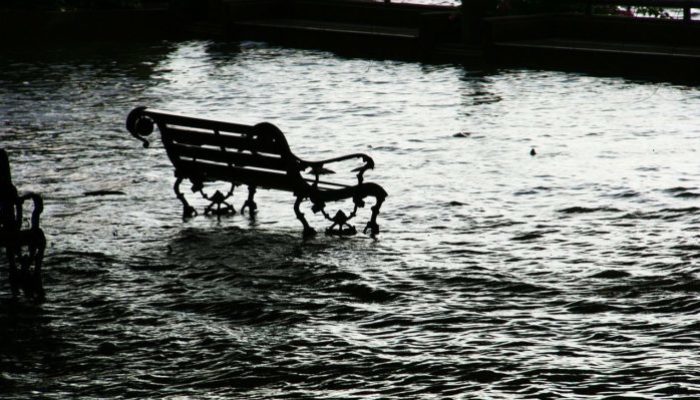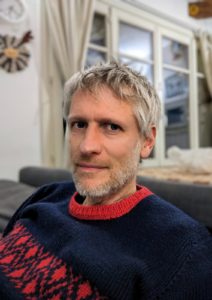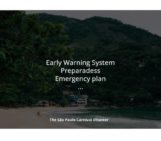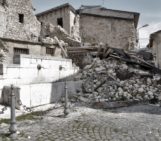
Extreme hydrological events affect billions of people worldwide, and their negative impacts will likely increase due to climate change, urbanisation and ageing infrastructure. Further understanding of hydrological extremes and societal responses to floods is critical in mitigating flood risk and creating better urban environments. In today’s interview, we talk with Prof. Alberto Viglione. Alberto has been awarded the 2023 Plinius Medal for seminal contributions to understanding and assessing hydrological extremes. This medal is awarded to outstanding scientists who have demonstrated outstanding research achievements in fields related to natural hazards, important interdisciplinary activity in two or more fields related to this topic, and research that has been applied in the mitigation of risks from natural hazards.

Prof. Alberto Viglione
Alberto, CONGRATULATIONS! You have been awarded the Plinius Medal for your outstanding scientific contributions to interdisciplinary natural-hazard research. We would like to learn more about you and your field of research. Please tell us who Alberto Viglione is.
Thank you very much! I am so honoured and excited about this award! Alberto Viglione is someone who has always loved to attend medal lectures because of the quality of the presenters and talks, and who didn’t imagine that one day he should prepare one (I am very scared indeed). I am fundamentally a shy person who is struggling to pretend not to be so. Conferences and talks have always intimidated me, and they still do. I know this is the case for many researchers (including those who are very experienced) whom I greatly admire, which reassures me a bit. Outside of the EGU-GA, I am an Associate Professor at the Politecnico di Torino in Italy. There, I teach hydrology and related topics, including Natural Hazard-specific ones such as Hydro-Meteorological Risk Assessment. I love teaching, but I love even more trying to solve riddles or, in other words, doing research. I’ve been lucky in my years as a student, PhD, and Postdoc to be guided (and then become a friend) by many researchers who inspired and transmitted to me their passion for this fantastic work.
Most of your research is about understanding and assessing hydrological extremes. What has motivated you to pursue this field of research?
Well, the reason why I ended up studying hydrology and extreme events is randomness, “of course”. I studied environmental engineering because it was available close to my parents’ home. Also, my PhD in hydrology was driven by chance. After graduating, in the middle of the summer, I started sending my CV around, but nobody responded (it was holiday time), and I spent the summer picking zucchini full-day, every day, including weekends. When a friend at Politecnico told me that Prof. Pierluigi Claps was searching for someone for a project on “hydrology”, I told myself, “anything but zucchini!” and that is why I started with hydrology :-). And floods became my topic later in Vienna, during my Postdoc period, because Prof. Günter Blöschl and colleagues were doing so many great things in flood research. But for floods, an earlier motivation existed. I witnessed the great 1994 flood event in my home area (south Piemonte, in Italy) and worked as a volunteer in the recovery actions after it occurred. That experience left a mark on me. As a kid, I always thought of water as a gift of nature and not a threat, and suddenly I discovered the other face of the medal. I am happy that my job now is related to and somehow a continuation of that volunteering activity.
What is your favourite aspect of your research?
I would say the favourite aspect of any research activity is “To boldly go where no man has gone before!” (cit. StarTrek). I am joking; I do not consider myself a “real” scientist… I am an engineer, so what I do is far from “rocket science”. But it still is a search for new and better methods, improving knowledge, and contributing to building a safer world for society. The fact that I have to work both with scientists and practitioners is a very positive aspect of my job. There is so much to learn from both worlds. One of the issues I worked on in the past was how to incorporate expert judgement in flood frequency analysis, which is traditionally a statistical exercise. About ten years ago, I worked with collaborators and experts using historical archival evidence, observations in similar places, and hydrological modeller experiences to improve the estimation of the design floods. We call that procedure “Flood Frequency Hydrology”, and that has been part of my work that really made it to practice (for example, flood estimation guidelines). I am very proud of it. More recently, I have been trying to demonstrate to practitioners that “uncertainty is useful”. The outcomes of this effort are uncertain… but they may be useful. That’s applied research, and I like it.
Evidence suggests that climate change will likely increase the intensity of extreme precipitation events and the risk of flooding in many parts of the world. How does your work contribute to flood risk mitigation?
The effect of climate change and other changes on floods and flood risk is complex and not the same everywhere and for all flood types. But yes, flood risk has increased in many parts of the world, and climate change has played a role. More importantly, climate change will likely play a key role in the future. My work has been mainly related to flood hazard assessment, and together with colleagues and the community of researchers, we are trying to account for changes explicitly in our models. There is still a lot to do to understand how floods have changed in the past. We are working at detecting where these changes can be observed and, more importantly, attributing these changes to their main drivers, both those related to climate and how landscapes, rivers and cities are managed. A better understanding of the causes is key in evaluating what the future may become and planning effective mitigation strategies. Another interesting and useful topic I’ve been looking at, which requires a lot of work from our community, is understanding how the long-term dynamics of floods and societal responses to floods have shaped (and eventually will shape) the evolution of risk. This is one of the objectives of socio-hydrology, to which I’ve given some contributions in the past, and I am giving some contributions today, being one of the authors of the International Association of Hydrological Sciences (IAHS) Panta-Rhei book, which shall be ready this summer (we hope).
A better understanding of the causes is key in evaluating what the future may become and planning effective mitigation strategies
In your opinion, what should be a priority in flood risk management?
Of course, robust flood risk management should combine many actions, including land management, structural defences, early warning systems and raising societal awareness. If I have to pick one, the last is particularly important now, at least in Europe. The fact that some of the casualties in the Marche flood of last September (Italy) were trapped in the underground garage because they were trying to save their car from the coming flood teaches us that there is a lot to do to raise risk awareness in the population through information campaigns and education (starting from primary schools). We all know that the best awareness-raising driver is experience. With better flood risk management, one would expect to decrease flood experience as much as possible, but something must be done to keep awareness (and preparedness) high. As many studies show (for example, socio-hydrology studies), the decaying of flood memory is one of the key factors leading to extreme flood losses. So, in Europe, avoiding this memory loss, or simply awareness rising, should be a priority. As we all know, priorities change of course in other parts of the world: for example, better land use management is a critical action and a difficult one, where urbanisation is growing a lot (for example, in Africa). But, again, robust flood risk management should come from the combination of the many actions available, with no exclusion.
Post edited by Joana Parente and Soheil Mohammadi




